|
|
|
Sort Order |
|
|
|
Items / Page
|
|
|
|
|
|
|
| Srl | Item |
| 1 |
ID:
111936
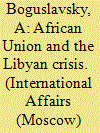

|
|
|
|
|
| Publication |
2012.
|
| Summary/Abstract |
ARLY IN SEPTEMBER 2011, the forces of the National Transitional Council (NTC) of Libya backed, on a mass scale, by NATO assumed control over the larger part of the country and captured Tripoli. The regime change became a fact yet the country will have to tread a long and arduous road of rehabilitation of its now practically non-existent infrastructure and address a more important and even more challenging task of national reconciliation and revival of national unity. It seems that external military interference (far beyond the limits outlined by UN Resolution 1973) has made this dual task even harder to achieve. It caused unnecessary loss of civilian lives, stirred up hard feelings which pushed the east and west of the country apart, destroyed civilian objects and started uncontrolled proliferation of all sorts of weaponry.
|
|
|
|
|
|
|
|
|
|
|
|
|
|
|
|
| 2 |
ID:
111937
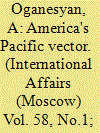

|
|
|
|
|
| Publication |
2012.
|
| Summary/Abstract |
"THE FUTURE OF POLITICS will be decided in Asia, not Afghanistan or Iraq, and the United States will be right at the center of the action," U.S. Secretary of State Hillary Clinton stated in her article which appeared in the November 2011 issue of Foreign Policy under a powerful title "America's Pacific Century." The Editors were even more explicit when they put "Our Pacific Century" on the cover.
The American diplomat has gone much further than mere statements of the region's impressive economic growth which shifted the center of world economy to Asia. She has made it clear that America intends to dominate the APR. Diplomatically the formula "America's Pacific Century" is highly ambiguous; placed in the context of the coming presidential elections it looks like a gauntlet thrown down to that part of the American opposition that talks about "coming home" to address the economic crisis and financial instability.
|
|
|
|
|
|
|
|
|
|
|
|
|
|
|
|
| 3 |
ID:
111941
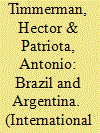

|
|
|
|
|
| Publication |
2012.
|
| Summary/Abstract |
ULY 18 marks the 20th anniversary of the Agreement Between the Republic of Argentina and the Federative Republic of Brazil for the Exclusively Peaceful Utilization of Nuclear Energy.
Through this agreement, Argentina and Brazil jointly renounced the development, possession and use of nuclear weapons, affirmed their unequivocal commitment to the exclusively peaceful use of nuclear energy and created the Brazilian-Argentine Agency for Accounting and Control of Nuclear Materials (ABACC) in order to monitor the commitments made.
|
|
|
|
|
|
|
|
|
|
|
|
|
|
|
|
| 4 |
ID:
111942
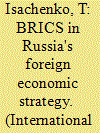

|
|
|
|
|
| Publication |
2012.
|
| Summary/Abstract |
IN THE CONTEXT of an analysis of the prospects and priorities of Russia's foreign economic policy, there has recently been an increased discussion of economic cooperation within BRICS (Brazil, Russia, India, China, and South Africa, the newest member of the group). It should be emphasized that the BRICS cooperation problem itself is not new, but until now all questions have been viewed through the prism of political cooperation and the development of a common platform on the key issues of the world order. The economic aspects of cooperation among the BRICS countries have become a subject of investigation relatively recently and there are still no clear assessments.
|
|
|
|
|
|
|
|
|
|
|
|
|
|
|
|
| 5 |
ID:
111950
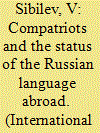

|
|
|
|
|
| Publication |
2012.
|
| Summary/Abstract |
ON OCTOBER 17-18, 2011, a World Thematic Conference of Compatriots called "On the Status of Russian Language in Foreign Countries" was held in Moscow under the aegis of the Government Commission on Compatriots Living Abroad (GCCLA). The conference, particularly such an extensive one, with 200 delegates from 91 countries and 80 guests from Russia in attendance, did not arise from scratch.
It was preceded by an interested and at times even fervent discussion of this topical issue at regional conferences of compatriots (I, for example, had occasion to participate in debates on this topic and understood from the discussion at the regional conference of compatriot associations of the Southern Caucasus in Krasnodar on September 22-23 of this year that the "great and powerful" [Russian language] enjoyed a far from favorable status in the CIS expanse), as well as at special round tables on the status of the Russian language held on the eve of the conference in Ukraine (Kiev), Kazakhstan (Almaty), and the Baltic states (Riga).1
|
|
|
|
|
|
|
|
|
|
|
|
|
|
|
|
| 6 |
ID:
111944


|
|
|
|
|
| Publication |
2012.
|
| Summary/Abstract |
THERE WERE TWO MEMORABLE EVENTS this autumn whose importance for today's international relations and foreign policy of the future can hardly be overestimated. The whole world was remembering with sorrow this past September 11 the terrorist attacks on New York City, Washington D.C. and Pennsylvania ten years ago. On October 1, without exaggeration, the entire part of humanity sober-minded and caring to remember marked 65 years of the sentences meted out to the Nazi criminals at Nuremberg.
|
|
|
|
|
|
|
|
|
|
|
|
|
|
|
|
| 7 |
ID:
111933
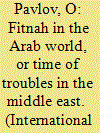

|
|
|
|
|
| Publication |
2012.
|
| Summary/Abstract |
NEARLY A YEAR HAS ELAPSED since the beginning of the Arab Spring; time has come to assess the preliminary results of the massive landslide started on a December day in 2010 by Mohamed Bouazizi, street vendor, who set himself on fire in a Tunis suburb to protest against police harassment and unemployment. This small stone set events in motion.
One after another the seemingly unshakable political regimes on the "Arab continent" were wiped out: two political doyens - Hosni Mubarak and Muammar Qaddafi - lost their "thrones"; President of Tunisia Zine El Abidine Ben Ali fled the country. Muammar Qaddafi lost even more than the throne - he lost nearly all his children and was shot through the head. Today when I am writing this article President of Yemen Ali Abdallah Saleh has come to the brink of resignation; King of Bahrain Khalifa still rules under pressure; the same can be said of President of Syria Bashar Assad. Reforms in Jordan are barely dragging on
|
|
|
|
|
|
|
|
|
|
|
|
|
|
|
|
| 8 |
ID:
111940


|
|
|
|
|
| Publication |
2012.
|
| Summary/Abstract |
THE SIXTH MEETING of the leaders of the Group of Twenty (G20) held in the city of Cannes (France) on November 3-4, 2011 effectively opened a new page in the history of international economic relations. Now the global economy and primarily its financial flows will be more transparent, informationally open, manageable and subordinated to the interests of the world community. This will be ensured by the Financial Stability Board (FSB), a body well known to the world community but with broader powers.
|
|
|
|
|
|
|
|
|
|
|
|
|
|
|
|
| 9 |
ID:
111948
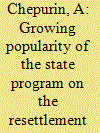

|
|
|
|
|
| Publication |
2012.
|
| Summary/Abstract |
A. Chepurin: Assisting in the voluntary resettlement to Russia of compatriots living abroad is an important area of our work, although it is clear that only a small part of the multi-million Russian diaspora, with which Russia is continuing to build a positive and friendly dialogue, will return to their country of origin in the near future.
|
|
|
|
|
|
|
|
|
|
|
|
|
|
|
|
| 10 |
ID:
111934
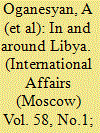

|
|
|
|
|
| Publication |
2012.
|
| Summary/Abstract |
Armen Oganesyan, Editor-in-Chief of International Affairs, advisor to the Minister of Foreign Affairs of the Russian Federation. As in Africa, in the 1960s, colonial empires started crumbling one after another, so today authoritarian regimes in the Arab world, which only recently had seemed quite stable, began to collapse. I would like to recall that the revolutionary wave of demonstrations and uprisings that swept through the Middle East and North Africa and came to be known as the "Arab spring" began in Tunisia on December 18, 2010 following Mohammed Bouazizi's self-immolation in protest against police corruption and brutality.
|
|
|
|
|
|
|
|
|
|
|
|
|
|
|
|
| 11 |
ID:
111951


|
|
|
|
|
| Publication |
2012.
|
| Summary/Abstract |
RETURNING LOST VALUABLES OF ART and history is an extremely relevant topic these days. Keeping in mind the enormous losses Russia suffered during the Revolution, Civil War, and the two World Wars, Russia's active presence in the international antique market is an absolute must for preserving and augmenting the nation's cultural potential.
The solicitous attitude toward the country's magnificent past expressed through purchasing works of national art at auctions is promoting Russia's positive image. Russia's presence in the international antique market is not only an indication of the country's prestige; it is also instrumental in raising it. After making a stunning debut in the market in the 1990s, buyers from Russia soon increased their presence at thematic sales to 90%. They were responsible for national art prices skyrocketing all over the world. After this, European auction houses began a new trend by setting up specialized Russian departments or organizing thematic sales. Moreover, in 2004, the MacDougall's auction house, which specializes only in Russian art, was established in London.
|
|
|
|
|
|
|
|
|
|
|
|
|
|
|
|
| 12 |
ID:
111949
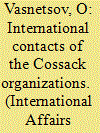

|
|
|
|
|
| Publication |
2012.
|
| Summary/Abstract |
AT ALL TIMES, the Cossacks have been and remain an inalienable part of the Russian state, its history, culture and spiritual values. Since time immemorial, the Cossacks preserved and multiplied their glorious traditions: patriotism, courage, and faith in God and the Russian people.
Leo Tolstoy said in his time that the entire history of Russia had been made by the Cossacks. It was thanks to their efforts that the state was spreading far and wide; they came to the newly acquired lands to settle them and start new towns; they protected the borders against numerous enemies of Russia's. Their foreign marches fortified Russia's international positions; the glory of the Cossacks and their valor echoed in Paris, Persia and in the Balkans.
|
|
|
|
|
|
|
|
|
|
|
|
|
|
|
|
| 13 |
ID:
111945


|
|
|
|
|
| Publication |
2012.
|
| Summary/Abstract |
ENERGY IS ONE of the most important areas of cooperation between Russia and the European Union. The fact that their economies are mutually complementary by nature and that they cooperate on a big scale is the key to energy security of Greater Europe. The substantial differences in defining the meaning of "energy security" make it difficult to identify challenges to energy security and find appropriate answers to them. Political motivations further complicate the situation and result in disregarding the political aspects of energy security.
|
|
|
|
|
|
|
|
|
|
|
|
|
|
|
|
| 14 |
ID:
111931
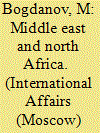

|
|
|
| 15 |
ID:
111947


|
|
|
|
|
| Publication |
2012.
|
| Summary/Abstract |
International Affairs: Dear Mr. Idevkhten, this year marks the 90th anniversary of the establishment of diplomatic relations between Russia and Mongolia. What, in your opinion, are the main values formed in our relations during this period?
Ambassador Idevkhten: On November 5, 1921, a Treaty Establishing Friendly Relations between Russia and Mongolia was signed in Moscow. This historic document provided the basis for mutual relations between the two countries. For nine decades now, Russia and Mongolia have been connected by ties of neighborliness and trust, equality and mutual respect.
|
|
|
|
|
|
|
|
|
|
|
|
|
|
|
|
| 16 |
ID:
111943
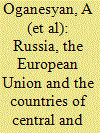

|
|
|
|
|
| Publication |
2012.
|
| Summary/Abstract |
Armen Oganesyan, Editor-in-Chief of International Affairs: It seems that everybody knows what is Eastern (or Central and Eastern) Europe. Throughout its history this geographical definition has gathered a lot of meanings yet so far its geographical boundaries have not been clearly identified either sociologically or politically. Today, all definitions of Central and Eastern Europe (CEE) are purely political concepts with easily discernable political loads. In the post-socialist era the ruling political elite, determined to get rid of "Eastern" as part of the description inherited from the communist past, accepted the "Central and Eastern Europe" definition as a compromise. In 1994, the U.S. Department of State driven by political considerations issued an instruction which replaced "Central and Eastern Europe" formula with "Central Europe."
|
|
|
|
|
|
|
|
|
|
|
|
|
|
|
|
| 17 |
ID:
111939


|
|
|
|
|
| Publication |
2012.
|
| Summary/Abstract |
RUSSIAN PRIME MINISTER Vladimir Putin's working visit to China on 11-12 October, 2011 was in many respects different than routine meetings between leaders of our two countries. The general implication of the talks made political scientists and experts ponder over the main subjects of the one-on-one discussions, what the two sides arrived at and what would happen next in the Russia-China relations.
|
|
|
|
|
|
|
|
|
|
|
|
|
|
|
|
| 18 |
ID:
111952
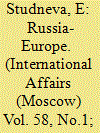

|
|
|
|
|
| Publication |
2012.
|
| Summary/Abstract |
"IT WILL LARGELY DEPEND upon the professionalism of journalists and their respect of ethical principles whether mass media will help to consolidate peace and find balanced and mutually acceptable ways of overcoming crisis situations or, in contrast, incite people to confrontation and violence." These were the words of Russian Foreign Minister Sergei Lavrov in his opening address at the international conference "Russia-Europe: Topical Issues in Contemporary International Journalism" that took place in Paris on November 24-25, 2011.
Lavrov's address expresses the gist of the discussion that took place at the conference among heads of leading Russian and international media, directors of European institutes in the humanities, Russian and European government officials, and well-known journalists from international media.
|
|
|
|
|
|
|
|
|
|
|
|
|
|
|
|
| 19 |
ID:
111946


|
|
|
|
|
| Publication |
2012.
|
| Summary/Abstract |
RUSSIA'S ACCESSION to the World Trade Organization (WTO) began as early as 1993, in the form of the Russian application to become a member of the General Agreement on Tariffs and Trade (GATT). When the WTO came into existence in 1995, the application was automatically transferred to the new organization. Even in this early phase the question of Russia's GATT/WTO membership was of great significance for Russia's relationship with the EU. For the EU as a strong economic actor, questions of trade are often paramount, and GATT rules were taken as the basis for the Partnership and Cooperation Agreement (PCA) between Russia and the EU, which was signed in 1994, although it did not come into force until 1997. During the phase of negotiating the PCA, it appeared clear that Russia would join GATT (later WTO) and adhere to the system of rules for economic interactions which had been established by most of the world's economies. Not only would Russia accept these rules, it would also become part of the process through which they were agreed upon, due to the way the WTO works. The organization develops through a series of "negotiation rounds," which allow it to address ever more issues dealing with trade and related spheres. The most recent of these is the Doha Round, which has been taking place since 2001 and does not show signs of a successful conclusion in the near future.
|
|
|
|
|
|
|
|
|
|
|
|
|
|
|
|
| 20 |
ID:
111953


|
|
|
|
|
| Publication |
2012.
|
| Summary/Abstract |
In memory of Colonel of the General Staff of the Imperial Army Stepan Voronin, Military Attaché at the Embassy of Russian Empire in Austria-Hungary
IN THE EARLY 20TH CENTURY, the Russian public recognized the great reforms of Prime Minister of Russia Pyotr Stolypin for what they were, viz. a "complete overhaul of everything in Russia." They stretched beyond the limits of the empire's domestic policies yet their foreign policy dimension and its impact on Russia's diplomacy remain little studied so far. History has taught us that none of the European states, including Russia, can pursue successful domestic policies without an efficient and well-substantiated foreign policy geared at the country's national interests. This is doubly important in the periods of reforms when newly established state and social institutions change the country's makeup. Foreign policy can be best described as a time-tested instrument the state has been using and continues to use to harmonize the aims of its domestic and foreign policy and achieve their unity for the sake of state (widened today to national) interests.
|
|
|
|
|
|
|
|
|
|
|
|
|
|
|
|
|
|
|
|
|